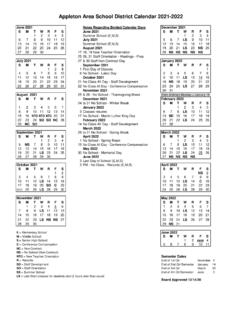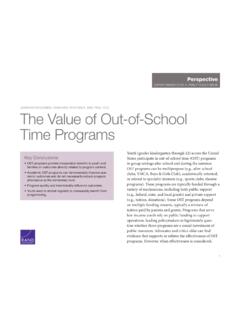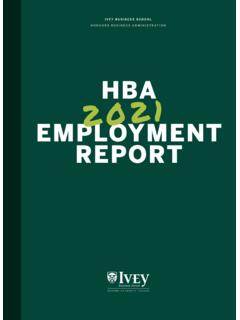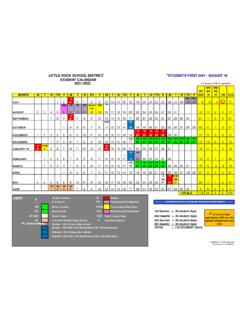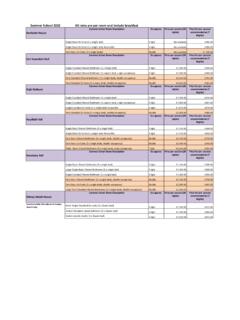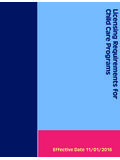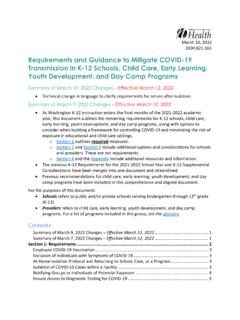Transcription of Summer Born Children - GOV.UK
1 Summer born Children Starting school : Advice for parents September 2020 2 Contents Who is this advice for? 3 Main Points 3 Commitment to amend the school admissions code 3 school starting age 4 Evidence on attainment 5 Making a decision 5 Seeking advice and information 5 Children with special educational needs 6 Children born prematurely 6 Case Studies 7 Important considerations when considering a delayed start to school 8 Moving back to the normal age group 8 Transfer to other schools 8 Government funded childcare 9 National Curriculum Tests 9 Implications of your child turning 16 before year 11 9 Delaying your child s admission to
2 school until the September after their 5th birthday 10 Requesting admission outside a child s normal age group 10 Making a request 11 Information to include 12 The admission authority s decision 13 What happens next? 13 Complaints 14 Glossary 15 3 Who is this advice for? This advice is for parents and carers1 who are considering delaying their Summer born child s admission to school . It is intended to help them decide what would be best for their child. It also provides information about the options available, and about how to arrange delayed admission.
3 Main Points Children usually start school in the September following their 4th birthday. All Children are entitled to a full time school place from this point. However, a parent does not have to send their child to school until they reach compulsory school age. A child will reach compulsory school age on a prescribed day2 on or after their 5th birthday. They must receive full time education from this point3. This means that Children born from 1 April to 31 August - Summer born Children do not need to start school until the September after their 5th birthday, a full year after they could first have started school .
4 school admission authorities are responsible for deciding whether to admit a child outside their normal age group4. They must make this decision in the child s best interests. Parents who are considering delaying their Summer born child s admission to school should seek advice from the schools they might like their child to attend, and from any professionals involved in the care of their child, so that they are able to make an informed decision. Commitment to amend the school admissions code In September 2015, we committed to amend the school admissions code so that Summer born Children can automatically be admitted to a reception class at the age of five where that is what their parents want, and can remain with the cohort with which they are 1 The guidance refers to parents throughout.
5 2 The prescribed days are 31 December, 31 March and 31 August. 3 P arents are required by law to ensure their child receives a suitable full time education once they reach compulsory school age. They usually do this by securing a school place for them, but this isn t the only way. For example, they could home educate their child. For ease, though, this document generally refers to Children having to attend school . Guidance on elective home education is available at 4 We will use the phrase normal year group to mean the year group a child would have been in had they entered school in the September following their fourth birthday.
6 4 admitted throughout their education. We remain committed to making that change when a legislative opportunity is available. school starting age All Children are entitled to a full time school place in the September following their 4th birthday. This is when most Children start school . Children born from 1 September in one year to 31 August the following year are normally educated together in one year group. Children are not required, however, to go to school (or other suitable education) until the first day of the school term that follows their 5th birthday.
7 The table below summarises the date at which the child reaches what is known as compulsory school age . Children must be in suitable full-time education from this point. For Children who are under compulsory school age, once a school place has been accepted, parents may, if they wish, agree with the school a pattern of part time attendance or a deferred start until later in that school year (but not later than the beginning of the Summer term). These arrangements should be discussed with the school . Summer born Children do not need to start school until the September after their 5th birthday, a full year after they could first have started school .
8 The guidance sets out some of the issues to consider in deciding whether to delay your child s start at school and how to make a request that your Summer born child starts reception age 5. A child born between: .. reaches compulsory school age on: .. and must be in suitable full-time education from: 1 September and 31 December 31 December The beginning of the spring term following their 5th birthday (usually in the first week of January) 1 January and 31 March 31 March The beginning of the Summer term following their 5th birthday (usually following the Easter holidays) 1 April and 31 August ( Summer born ) 31 August The beginning of the autumn term following their 5th birthday (usually in the first week of September)
9 5 Evidence on attainment There is evidence that the oldest pupils in a class will outperform their peers on average. This means that autumn born Children achieve higher results than classmates born in the spring or Summer on average. But this does not mean every Summer born child will achieve lower results than their older classmates. Most Summer born Children meet or exceed the expected standard in the reception year. The gap in attainment between Summer born Children and their peers narrows as they get older5. Children develop at different rates.
10 The younger Children in a class tend to make faster progress than their older classmates; though Children may start at quite different levels of development, they are likely to end up at a much more similar level. Making a decision Most Children thrive when starting school at age 4. Nonetheless, there are some Children , particularly those with developmental delays or medical conditions delaying their school readiness, who would benefit from a delayed start to school . If you are considering delaying your Summer born child s start at school , you should consider the implications of a delayed start to reception class set out in Important considerations and you should discuss your child s situation with relevant professionals.










